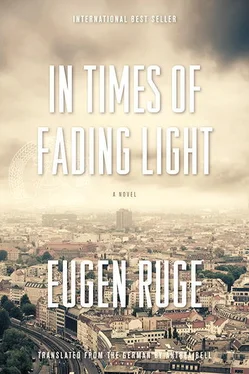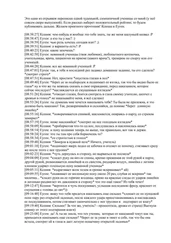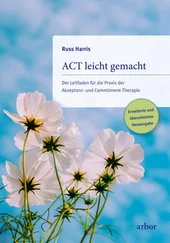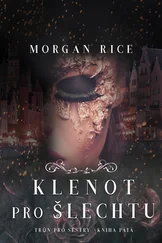But after the argument when they last visited, in the summer, she was determined to say no more on that subject. The short time that Sasha would spend in Neuendorf was too precious to be wasted quarreling. These days she should be glad he was coming at all. Last year, just before Christmas, the two of them had said they wouldn’t be here, they were flying to the Canaries for the holiday season—what an odd notion—and Irina had spent Christmas alone with Kurt and Charlotte. This year, however, she was determined to have a proper Christmas Day again. Who knew, it might be for the last time in this house. But she wasn’t going to say anything about that, she had resolved, not this evening.
She would cook her Monastery Goose, the same as ever. There would be homemade stollen with the coffee. And when the Christmas goose was all gone, and the stollen was eaten, thought Irina as she cut up the dried figs and apricots, when the political discussions had died down, and the unwrapping of presents was over, when she had put the china in water to soak and taken Charlotte back to the nursing home, then, thought Irina, she would allow herself a cognac—just one!—and enjoy the hour that was always the best part of Christmas, the hour when it was all over, when they sank into the comfortable chairs in the seating corner, and Kurt began puffing away at his vanilla-scented tobacco, when they had amused themselves sufficiently over the evening’s catastrophes both large and small, and the men finally rolled up their sleeves and played a game or two of chess…
Dismal church music began droning away on the radio. Irina turned the volume down, but didn’t switch the radio off to be on the safe side, although of course it was pure superstition to fear that something might happen to Sasha if she stopped listening to the traffic bulletins. She drew deeply a couple of times on her cigarette, which was only just glowing in the ashtray, then carefully stubbed it out. Then she melted some butter in a medium-sized pan, tossed in the chopped fruit, and added a shot of cognac. A waft of sweet aroma rose to her nostrils, and it was the smell of— whisky. Tchyort poberí!
Baffled, Irina looked at the bottle. She had bought it specially for Christmas evening, standing for a good ten minutes in front of the shelf. She still wasn’t accustomed to the confusing array of different brands on offer. The one thing you couldn’t get these days—and this, too, was strange—was Armenian cognac. Although you could get French cognac, and Greek, Spanish, Italian, and Austrian cognac, and cognac from heaven knows where else. After much wavering, she had finally decided on a particularly expensive Indian cognac, something special, she had thought, for the holiday season—and now it turned out to be whisky!
She tasted the fruit and whisky mixture—the flavor was not bad, but peculiar. All she could do was pour the delicious liquid, made particularly fruity by the halved fresh grapes, carefully into a jar (there wasn’t all that much of it, but it might come in useful for something) and toss the fruits in the pan again—but what with? Rum might do, thought Irina. At least for the stuffing of the goose. She would get by with port wine and honey for the decoction.
She let the fruits steep in rum for five minutes. Now she turned to the goose: took out the giblets, placed them in a bowl, washed the goose, patted it dry with paper towels—ah, paper towels, the invention that made the fall of the Wall worthwhile, was Kurt’s little joke these days. She cut off the superfluous fat, removed the sebaceous gland, pierced the goose under the wings with a skewer and rubbed it with salt, inside and out. Then she stuffed it and sewed the bird up, a performance that for some time now, or to be precise since her hysterectomy, had unfortunate associations for her… but she wasn’t going to think about that, either.
Now she had forgotten to preheat the oven. She lit the gas, put more water on to heat, using the same match, and burnt her fingers slightly when, still with the same match, she lit herself a cigarette. Then, at her leisure, she examined the bottle that she had bought by mistake: Single Malt, said the label, not a word about whisky—or at least, the lettering was so small that she couldn’t read it without glasses. Well, she must at least find out what the stuff tasted like neat. Just as she was raising the bottle to her lips, she saw Kurt in the doorway.
“I’m only tasting it,” said Irina.
By way of proof she held up the bottle, but as she had already used some for the stuffing a fair amount was missing.
“Oh, wonderful.” said Kurt. “Then I suppose I’ll have to go and fetch Charlotte now.”
“Wait a minute, I’ll just put the goose in the oven and then I’ll drive down to collect her,” said Irina.
Kurt held up one hand, dismissing the idea. “I’ll take a taxi.”
“I haven’t been drinking,” Irina said again.
“We won’t have any argument about it,” said Kurt. “I’m going to fetch her now. Just one thing I’d like to ask you, Irushka: please stop drinking. The children are coming today…”
“I am not drinking!”
“Good,” said Kurt. “Then that’s all right!” And he left the kitchen.
Irina poured hot water to two fingers’ height into the roasting dish, put the goose into it, covered the dish with its lid and put it in the oven, setting the kitchen timer to an hour and a half. Then she stripped the outer leaves off the red cabbage, took the big knife, and cut it in half with a mighty blow. And then she picked up the mixture of fruit juice and whisky—and drank it. First, it wasn’t really alcohol. And second, she was cross.
She picked up the big knife again and began slicing the red cabbage thinly… oh yes, she was cross! Not just because he implied that she was drinking—that too, of course. But also because of that reproachful, hurt tone of voice… as if it were some kind of imposition for him to go and collect his mother. And she, Irina, had a guilty conscience herself! But Charlotte was his mother! Why was it taken for granted that she would drive to the nursing home? Just because Kurt couldn’t drive a car? If you took that line of reasoning, he couldn’t do anything… and that was a fact.
Kurt didn’t bother about anything, thought Irina, cutting up red cabbage. Of course, it had been the same in the past, but it was worse these days. She could understand that everything agitated him. He was fighting against the “liquidation” as they called it now, of his institute. He was always out and about. Went to Berlin more often than before, he had even been to Moscow once because an archive of some kind was suddenly accessible. He wrote letters and articles all the time. Had bought himself a new typewriter specially: an electric typewriter! Four hundred marks! Kurt, who had to be forced to buy himself a pair of shoes, had spent four hundred Western marks on a typewriter—while she still felt bad about paying with this valuable new money for things like butter and rolls…
And yet it wasn’t even clear how much of a pension Kurt would get now, after the changeover. Not to mention her own pension. All of a sudden she was supposed to produce records of her employment from Slava: talk about bureaucracy! And she had always thought the GDR was bureaucratic… Presumably she wouldn’t get her supplementary pension now, either (the GDR had granted her a pension as what they called a victim of Nazi persecution, to make up for the honorary pension she would have received in the Soviet Union as a “war veteran”). She could hardly suppose that the West German authorities would reward her for having fought against Germany in the Red Army… and if they lost the house now, too, that was it. Even if they were allowed to go on living here after the “reassignment”—another of those words that had come into use with the fall of the Wall—they would hardly be able to pay the rent indefinitely. And the irony of it was that she herself, by extending the attic and building on the room for Nadyeshda Ivanovna, had almost doubled the living space of the house—and thus the rent that could be expected for it.
Читать дальше












